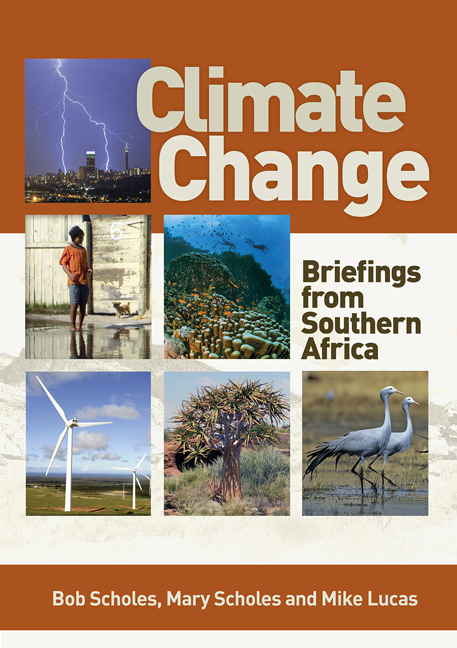Book contents
- Frontmatter
- Acknowledgements
- Contents
- Foreword
- Acronyms and abbreviations
- Preface
- How do governments assess climate change?
- Section 1 Earth system science: The processes that underlie climate change
- Section 2 Consequences of a changing climate for the Southern African environment
- Section 3 Consequences of a changing climate for society
- Section 4 What we can do to avoid and adapt to climate change
- Introduction
- 1 Is it cheaper to tolerate climate change or prevent it?
- 2 Is carbon trading desirable or useful?
- 3 Is it possible to take carbon dioxide out of the atmosphere?
- 4 Could fertilizing the oceans fix climate change?
- 5 Could we reduce incoming solar radiation?
- 6 Are there viable alternatives to coal for South Africa?
- 7 Can nuclear power provide the clean energy we need?
- 8 Can we turn garbage into energy?
- 9 Do biofuels offer a solution?
- 10 Could spekboom save our bacon?
- 11 Can we help plants and animals adapt to climate change?
- 12 Can we build climate-friendly houses and cities? 170
- 13 How can I reduce my carbon footprint? 173
- Codicil Is there a dangerous level of climate change?
- Glossary
- List of figures
- References
- Reading list
- Index
1 - Is it cheaper to tolerate climate change or prevent it?
from Section 4 - What we can do to avoid and adapt to climate change
Published online by Cambridge University Press: 20 April 2018
- Frontmatter
- Acknowledgements
- Contents
- Foreword
- Acronyms and abbreviations
- Preface
- How do governments assess climate change?
- Section 1 Earth system science: The processes that underlie climate change
- Section 2 Consequences of a changing climate for the Southern African environment
- Section 3 Consequences of a changing climate for society
- Section 4 What we can do to avoid and adapt to climate change
- Introduction
- 1 Is it cheaper to tolerate climate change or prevent it?
- 2 Is carbon trading desirable or useful?
- 3 Is it possible to take carbon dioxide out of the atmosphere?
- 4 Could fertilizing the oceans fix climate change?
- 5 Could we reduce incoming solar radiation?
- 6 Are there viable alternatives to coal for South Africa?
- 7 Can nuclear power provide the clean energy we need?
- 8 Can we turn garbage into energy?
- 9 Do biofuels offer a solution?
- 10 Could spekboom save our bacon?
- 11 Can we help plants and animals adapt to climate change?
- 12 Can we build climate-friendly houses and cities? 170
- 13 How can I reduce my carbon footprint? 173
- Codicil Is there a dangerous level of climate change?
- Glossary
- List of figures
- References
- Reading list
- Index
Summary
In the long run, the cumulative economic costs of climate change will be far greater than the cumulative costs of reducing greenhouse gas emissions. The problem is that the emission reduction costs must be incurred soon, but the benefits will only be felt later.
With foresight, the financial costs of avoiding or reducing climate change impacts are minimized if the investments are made several decades before the impacts occur. This is because the climate system has several built-in timelags, and because large and long-term investments are required to avoid future climate change challenges, particularly in the energy sector.
People value income in the future less than income in the present. Economists capture this ‘time preference of money’ as a number known as the discount rate. A high discount rate favours the present over the future, while a low discount rate favours the future. The choice of discount rate used has an enormous effect on which investments are deemed cost-effective. At one extreme, private sector investors equate the discount rate to the cost of borrowing money, which is usually 5% or more above the inflation rate. The social discount rate is the return expected on social investments, and is significantly lower – perhaps 1 to 3% per annum. At the other extreme, some people apply ethical arguments to suggest that the discount rate should be zero or even negative. The basis of this argument is that almost everyone values their children's and grandchildren's lives above their own, and will make great personal sacrifices on their behalf.
Whether it is cheaper to tolerate climate change or to prevent it has always been a technically challenging analysis, given the large uncertainties on both sides. Arguments based on commercial discount rates and promoted by sectors with a strong interest in maintaining the status quo suggest that the costs of avoiding climate change far exceed the costs of adapting to climate change. Their preference is to emit greenhouse gases now and deal with the consequences later. In this view, mitigation costs tend to be overestimated, for instance by not considering the co-benefits of reducing pollution and waste, or underestimating the fall in cost when new, renewable technologies are adopted at large scales. In contrast, the true adaptation costs are underestimated.
- Type
- Chapter
- Information
- Climate ChangeBriefings from Southern Africa, pp. 142 - 144Publisher: Wits University PressPrint publication year: 2015



